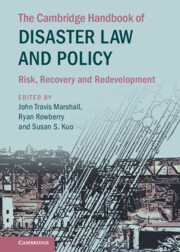Book contents
- The Cambridge Handbook of Disaster Law and Policy
- The Cambridge Handbook of Disaster Law and Policy
- Copyright page
- Dedication
- Contents
- Figures
- Maps
- Tables
- Contributors
- Foreword: Current Trends in Disaster Law and Policy
- Acknowledgments
- Introduction
- Part I Critical Perspectives on the Evolution of Disaster Law and Policy
- Part II Effective Governance as an Imperative for Responsive Disaster Law and Policy
- 3 Governance Structures for Recovery and Resilience
- 4 Governance Strategies for Mitigating Urban Heat Island Effect
- 5 Regulatory Institutional Considerations for Preventing Mining Dam Disasters in Brazil
- 6 Integrating Disaster Risk Reduction and Climate Change Adaptation in the Context of Sustainable Development in Africa
- 7 Climate Resilience in the Greater Bay Area of South China
- 8 An Adaptive Legal Framework for Water Security Concerns in the Guangdong-Hong Kong-Macao Greater Bay Area
- Part III Law’s Role in Promoting Hazard Mitigation: Intergovernmental, International, National, and Local Approaches
- Part IV Private Sector Initiatives to Promote Disaster Resilience and Recovery
- Part V Lawyers As Disaster Law and Policy Leaders: Training for Students and Guidance for Practitioners
- Part VI Cultural Heritage Protection and Cross-Disciplinary Opportunities for Advancing Disaster Law and Policy
- Part VII Disasters and Vulnerable Communities
7 - Climate Resilience in the Greater Bay Area of South China
from Part II - Effective Governance as an Imperative for Responsive Disaster Law and Policy
Published online by Cambridge University Press: 27 October 2022
- The Cambridge Handbook of Disaster Law and Policy
- The Cambridge Handbook of Disaster Law and Policy
- Copyright page
- Dedication
- Contents
- Figures
- Maps
- Tables
- Contributors
- Foreword: Current Trends in Disaster Law and Policy
- Acknowledgments
- Introduction
- Part I Critical Perspectives on the Evolution of Disaster Law and Policy
- Part II Effective Governance as an Imperative for Responsive Disaster Law and Policy
- 3 Governance Structures for Recovery and Resilience
- 4 Governance Strategies for Mitigating Urban Heat Island Effect
- 5 Regulatory Institutional Considerations for Preventing Mining Dam Disasters in Brazil
- 6 Integrating Disaster Risk Reduction and Climate Change Adaptation in the Context of Sustainable Development in Africa
- 7 Climate Resilience in the Greater Bay Area of South China
- 8 An Adaptive Legal Framework for Water Security Concerns in the Guangdong-Hong Kong-Macao Greater Bay Area
- Part III Law’s Role in Promoting Hazard Mitigation: Intergovernmental, International, National, and Local Approaches
- Part IV Private Sector Initiatives to Promote Disaster Resilience and Recovery
- Part V Lawyers As Disaster Law and Policy Leaders: Training for Students and Guidance for Practitioners
- Part VI Cultural Heritage Protection and Cross-Disciplinary Opportunities for Advancing Disaster Law and Policy
- Part VII Disasters and Vulnerable Communities
Summary
Article 7.1 of the Paris Agreement establishes that parties should aim at enhancing adaptive capacity, strengthening resilience, and reducing vulnerability to climate change. While many climate hazards and vulnerabilities are beyond territorial control, a readiness to withstand and recover from them must be delivered locally. This chapter discusses climate-related vulnerability, adaptation, and resilience of the Greater Bay Area of China (GBA), an area that has been identified by the Chinese government as an engine of economic development but which has historically been vulnerable to flooding. After providing a contextual introduction to the GBA project, the chapter reviews key studies on past, current, and future climate trends focusing on meteorological, climatological, hydrological, and geophysical hazards. It then surveys adaptation policies and plans already implemented in GBA cities to assess what works and what does not and where the gaps are. Finally, the discussion focuses on the drivers and barriers for the uptake of technology for flood prevention and for the deployment of emergency responses. The aim of this discussion is to identify the opportunities and risks of technology in building future-ready local skills and citizen engagement for climate resilience. Given the ambitious plans for the GBA to contribute to the economic development of China, existing and projected vulnerabilities to climate hazards and their potential impact on the developed environment and physical infrastructure, business and industry, energy supply, financial services, human health, water resources, and biodiversity may not only hamper GBA plans but also put its businesses and citizens at risk. Technological innovation diminishes this vulnerability, but drivers and barriers to its uptake must be either identified and enhanced or removed accordingly.
- Type
- Chapter
- Information
- The Cambridge Handbook of Disaster Law and PolicyRisk, Recovery, and Redevelopment, pp. 107 - 130Publisher: Cambridge University PressPrint publication year: 2022



